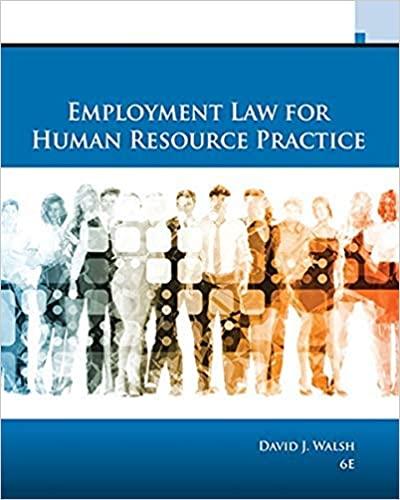Ms. Whites need for FMLA leave was based on an injury to her knee, which occurred in
Question:
Ms. White’s need for FMLA leave was based on an injury to her knee, which occurred in April 2010. An orthopedist prescribed physical therapy, and told her she might need surgery if the knee remained unstable. She was able to work for nearly all the rest of 2010, despite her knee injury. Beginning in December, 2010, she was absent from work due to other health issues, but called her employer to notify them. On January 27, 2011, still absent from work, Ms. White reported to her primary care physician that she had fallen twice the previous weekend, reinjuring the same knee. This reinjury and the necessary treatment formed the basis of her need for FMLA leave. The next day, Ms. White spoke with two Beltram supervisors, advising of the knee reinjury and her referral to an orthopedic physician. One sent her a physician’s certification form and told her that it was due within 15 calendar days, on February 12, 2011. On February 8, Ms. White saw her orthopedist and signed a consent form for a knee operation, but she was not able to complete the FMLA paperwork because her orthopedist was taking a leave of absence, and she was transferred to another doctor. One day before the certification was due, White called the supervisor and explained the situation, and asked for an extension. The parties disagree about the time period of the extension, the supervisor saying it was for “a couple of days,” and Ms. White saying the supervisor told her to get the form in “as soon as possible,” but did not give a specific due date. On the same date, the supervisor asked White to send doctor’s notes explaining her absences since December 27, 2010, which Ms. White did. One note, completed January 18, 2011, said that White was under the doctor’s care form December 28, 2010 to January 24, 2011. The other note, completed on January 24, 2011, said that Ms. White would be able to return to work on January 31. 2011. Shortly after receiving these notes, the supervisor fired White. The supervisor said she never received White’s FMLA paperwork, but White said she faxed the form to her employer on February 16. That form indicated that her knee injury, the planned surgery, and post-operative rehabilitation would make her unable to perform her job from January 28 to April 28, a period of almost 13 weeks. White underwent surgery on March 7, 2011. About a year later on March 30, 2012, her surgeon signed a letter stating that Ms. White recovered “extremely well” and could have returned to work on March 28, 2011 – nearly a month earlier than the original estimate, and well within the 12 weeks guaranteed by the FMLA.
1. What were the legal issues in this case? What did the appeals court decide?
2. What evidence was there that the plaintiff had a “serious health condition”? Why does the appeals Court say that it doesn’t matter whether all of that evidence was at the employer’s disposal when it made its termination decision?
3. What does the FMLA require of employees in terms of notice to their employers? Why does the Appeals Court conclude that the notice provided by the plaintiff was sufficient? That it was timely?
4. Should the expected duration of the period of incapacity associated with a serious health condition be a factor in determining eligibility to receive FMLA leave? Why or why not?
Step by Step Answer:






